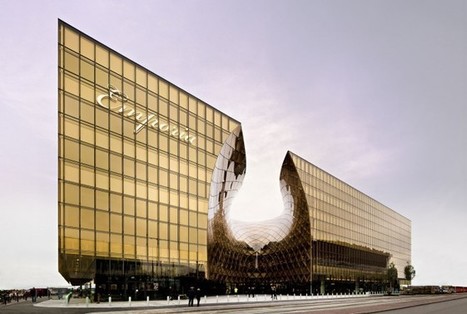 Your new post is loading...
 Your new post is loading...
More than 2 million passwords for sites including Facebook, Yahoo, LinkedIn, Twitter and Google have been stolen and posted online, BBC reports.
Security firm Trustwave has discovered the trove of login credentials, email credentials and passwords, it announced on Tuesday.
Security experts told BBC that a criminal gang may be behind the security breach. The stolen information can be used to extract people's personal information from the websites, which can then be sold, according to BBC.
“Facebook takes people’s information security extremely seriously and we work hard to protect it," a Facebook spokesperson told The Huffington Post. "While details of this case are not yet clear, it appears that people’s computers may have been attacked by hackers using malware to scrape information directly from their web browsers."
The spokesperson also emphasized that all of the compromised passwords have been put into Facebook's password reset process, and that Facebook users can protect their accounts by activating Login Approvals and Login Notifications in their security settings.
"We immediately reset the passwords of the affected accounts," a spokesperson from Twitter told HuffPost. A Google spokesperson pointed us to a blog post about the ways in which the company combats "account hijackers."
"This particular incident occurred when users' systems were accessed through malware. It’s likely that these systems had out-of-date browsers or operating systems. We have implemented password resets on these accounts to protect our users," a Yahoo spokesperson told HuffPost. "We urge our users to keep their systems and applications updated, regularly run anti-virus software and not install programs from untrusted sources. We also encourage our users to set up second sign-in verification so they're notified when someone attempts to log into their account from another device."
Click headline to read more and watch video clip--
Telkom Wholesale and Networks is investing R12 billion in its next-generation high-speed broadband network to ultimately support South Africa's broadband ecosystem at large.
In a statement released today, the company's acting MD for Wholesale and Networks, Alphonzo Samuels, says free DSL speed upgrades during 2012 and 2013, as well as an effective IP Connect price reduction of 43% in the last year, are the most visible elements of Telkom's commitment to invest in broadband.
There is, however, much happening behind the scenes, with significant investment in transport, aggregation and access networks supporting the broadband ecosystem, says Samuels.
"The evolution of the Telkom network is ongoing, and the impact of our deployed infrastructure has done much to grow the adoption of broadband in South Africa. As the country's foremost supplier of wholesale network products and services, we have been committed to enabling our customers to deliver on the connectivity demands that South Africans have come to expect," he says.
Telkom recently announced DSL speed upgrades, at no additional cost to ISPs, which it says will be finalised in February 2014. "This investment is important for the evolution of broadband in South Africa and the cost carried by Telkom Wholesale and Networks was not passed to the industry," explains Samuels.
Click headline to read more--
European governments might have national targets to meet the demands of climate change. Many European cities, however, may not be in the mood.
Diana Reckien of Columbia University in the US and 11 European colleagues report in the journal Climatic Change that one in three cities have no plans to reduce greenhouse gas emissions, and seven out of 10 cities have no formal plans to adapt to climate change.
Cities – think factories, offices, cars, public transport, lighting, central heating, air conditioning, waste disposal and huge and continuous programmes of building, demolition and renewal with steel, concrete, brick and glass – account for between 31% and 80% of global greenhouse gas emissions.
Cities represent huge concentrations of people and economic investment, vulnerable to flood, windstorm, extremes of temperature and other climate-related violence. And cities don’t actually have to involve themselves in the complex international deals that bedevil government climate policies.
Cities are at liberty to decide to reduce emissions, and to adapt to any future hazards that citizens may identify.
The research went beyond questionnaire and interview. The researchers focused on action rather than words. They made a detailed analysis of 200 large and medium-sized urban areas – large means more than 250,000 people; medium is defined as more than 50,000 – in 11 European countries.
Click headline to read more--
When you’re trying to bring the world data at faster and faster rates, every little bit of efficiency matters. That’s why scientists have spent years attempting to coax as much capacity and speed out of fiber optic cables as possible.
Data signals travel through fiber optic cables in the form of pulses of light, and by packing those signals closer together, you can send more data. At the Swiss Federal Institute of Technology in Lausanne, researchers have figured out for the first time how to do so, allowing 10 times more data to pass through the cables. They published a paper today (subscription required) in Nature Communications.
“Since it appeared in the 1970s, the data capacity of fiber optics has increased by a factor of 10 every four years, driven by a constant stream of new technologies,” paper co-author Camille Brès said in a release. “But for the last few years we’ve reached a bottleneck, and scientists all over the world are trying to break through.”
Researchers have known for some time that packing signals closer together would be an important breakthrough, but no one was able to do so without causing interference between the pulses. The Lausanne team found that the secret lay in creating pulses that had uniform frequencies, which prevents them from affecting others nearby. They were able to create ideal pulses with 99 percent accuracy.
Click headline to read more--
An alliance of corporations and conservative activists is mobilising to penalise homeowners who install their own solar panels – casting them as “freeriders” – in a sweeping new offensive against renewable energy, the Guardian has learned.
Over the coming year, the American Legislative Exchange Council (Alec) will promote legislation with goals ranging from penalising individual homeowners and weakening state clean energy regulations, to blocking the Environmental Protection Agency, which is Barack Obama’s main channel for climate action.
Details of Alec’s strategy to block clean energy development at every stage – from the individual rooftop to the White House – are revealed as the group gathers for its policy summit in Washington this week.
Click headline to read more--
For more than 1,000 years people of Fukushima Prefecture in Japan have gathered every summer to celebrate an ancient tradition of the samurai. The Soma Namaoi festival is as much a part of their heritage as the warrior and equestrian culture it reenacts and honors, and in the face of radiation from the nearby Daiichi nuclear reactor, they’ve decided the show must go on.
Tokyo photographer Noriki Takasugi’s series Fukushima Samurai — The Story of Identity captures the samurai of the Soma Nomaoi festival as they risk their own health to sustain a tradition that largely defines them.
Many of the men in Takasugi’s photos are from the hard-hit town of Odaka-ku, who along with thousands of others in Fukushima were displaced or saw their homes destroyed when its residential coastlines were swept away in the tsunami of 2011. Along with the houses went the accoutrements of Soma Nomaoi — their weapons, their ceremonial Jinbaori clothing, and, sadly, their horses. Much of what they’ve worn for the festival since the tsunami is borrowed or otherwise cobbled together, and after spending months in the vicinity of the Daiichi plant before daytime visits were again allowed, many of the clothes they did retrieve were likely irradiated. In the Odaku-ku area, Takasugi says her geiger counter measures radiation between five and 50 times the levels registered in her Tokyo neighborhood.
“None of the people I asked cared about the irradiated clothes,” says Takasugi. “It was my impression that it was more important for them to have their weapons and their ceremonial costumes.”
Click headline to read more--
The developers of Emporia, a new mixed-used development in Malmö, Sweden, wanted to attract commuters from the local train station to the combination mall, supermarket, office tower, and apartment building they planned to create.
Realizing that a stunning design could be a way to attract pedestrians they commissioned Wingårdhs a 170 person architecture firm based in Göteborg, Sweden to use the $390,000,000 construction budget to create a landmark that would act like a beacon to pedestrians. The result is a colorful collection of interior spaces, wrapped in a sinuous, psychedelic surface that appears to be on fire when the sun strikes it right.
The structure’s most distinctive features are two colorful glass-clad entrances inspired by nature—an amber colored entrance pays homage to Sweden’s trees and the semi-precious stones produced by their resin and a swirling blue entry that echoes a nearby strait. The serpentine surfaces of the building are jolting, but are also notable achievements in structural engineering.
Click headline to read more--
U.S. regulators have given the green light to Microsoft's acquisition of Nokia's handset business, moving the deal a major step closer to wrapping up.
The Department of Justice (DOJ) approved the transaction on Friday, Nov. 29, and the Federal Trade Commission (FTC) published the notice today on its website.
"We look forward to the date when our partners at Nokia will become members of the Microsoft family, and are pleased that the Department of Justice has cleared the deal unconditionally," a Microsoft spokesperson said in an emailed statement.
Microsoft announced the acquisition of Nokia's Devices and Services business Sept. 3, when it said it would pay the Finnish firm a total of $7.2 billion, a figure that included $2.2 billion to license Nokia's patents.
At the time, analysts contended that the purchase was a defensive move to keep the phone maker from going under or falling into the hands of an Android-first rival.
Nokia sells the bulk of the world's smartphones powered by Microsoft's Windows Phone operating system.
Nokia's shareholders approved the deal two weeks ago at an emotional meeting in Helsinki, where shareholders grilled company executives for several hours before voting.
Regulators in India, Israel, Russia and Turkey have also okayed the acquisition.
Still outstanding is approval by European Union (EU) antitrust authorities, who are to announce their decision Wednesday. Ten days ago, Reuters, quoting anonymous sources, said that the EU would clear the deal.
Click headline to read more--
David Thodey, CEO of Telstra, gave the welcome address in which he paid tribute to Mike Quigley, his formidable achievements at NBN Co and his integity throughout the working relationship between the two companies.
At this event Mike was formally awarded the Charles Todd Medal of 2013 which had been announced at the Charles Todd Oration on 23 October. Michael Malone, CEO and Founder of iiNet and speaker at that event, was the other recipient.
Click headline to read the text of Mike Quigley's presentation--
It's no secret that Chinese telecom gear maker Huawei and the US government aren't exactly best friends -- for the past couple of years, the US has accused Huawei of cyberespionage on behalf of the Chinese military.
It appears this spat may now have escalated into a full-fledged falling-out.
Huawei CEO Ren Zhengfei told French news site Les Echos last week that he no longer wanted to stay in the US market.
"If Huawei gets in the middle of US-China relations," and causes problems, "it's not worth it," Ren reportedly said, according to a Chinese transcript of the interview translated by Foreign Policy. "Therefore, we have decided to exit the US market, and not stay in the middle."
It's unclear how serious Ren's threats are or if there's any timeline to Huawei possibly pulling out of the US market. When contacted by CNET, a Huawei spokesperson was vague regarding Ren's statement.
"We remain committed to our customers, employees, investments, and operations and more than $1 billion in sales in the US," the spokesperson said, "and we stand ready to deliver additional competition and innovative solutions as desired by customers and allowed by authorities."
Click headline to read more--
We’re gradually entering the age of the small cell, tiny mobile cell sites that are mounted on walls and light poles rather than high up on towers. But as the topology of the network changes so do the logistics of deploying it. Carriers can’t just stick these cells anywhere they choose. They have to figure out how to get them power and how to connect them back to their networks as well as get local government approval to install them.
Alcatel-Lucent believes it has an answer to that problem: Around the world there are innumerable ISPs, utilities, cable companies, fiber backhaul providers and even outdoor advertisers that have the both the real estate and the infrastructure to host small cells. Why not pair them with carriers looking to shrink down their networks?
The Franco-American network equipment maker on Tuesday launched a new small cite certification program with the aim of pre-designating millions of outdoor and indoor locations as small cell-ready. For instance, a company that hosts outdoor advertising would show that its billboard locations not only have the space to mount a small cell, but have the necessary power and accessible nearby fiber lines to backhaul the cell’s traffic. It would also have to prove that any small cell deployed there would meet the local community’s zoning and planning regulations.
Alcatel-Lucent has already pre-certified 600,000 sites in Europe and the U.S. and has signed up about a dozen site providers, including tower real-estate firm Crown Castle, backhaul provider EdgeConneX and fiber ISP Zayo. According to Alcatel-Lucent VP of small cells Mike Schabel, the program is also working with several large cable companies, which are of particular note since their coax is practically everywhere. Carriers partnering with a cable provider could literally hang their small cell networks off of cable lines.
Click headline to read more--
A year and a half ago, we thought this plan was dead in the water, but apparently while we weren't paying attention, a plan moved forward in Italy to take significant copyright enforcement powers out of the courts and, instead, give it to the Italian regulator AGCOM.
If you want to see a recipe for a bad idea, this is it. Regulators are very much subject to regulatory capture, and a regulatory board entirely focused on copyright enforcement will almost certainly be controlled by maximalists who come from industry, rather than those with the public benefit in mind.
As it stands, the proposal is currently being reviewed by the EU to see if it complies with EU directives. A ruling in favor of the AGCOM plan would have a huge negative impact on Italy, innovation and culture.
Click headline to read more--
A Japanese firm has come up with the idea of constructing an array of solar cells around the Moon's equator to harvest solar energy and beam it back to Earth. The Shimizu Corporation proposes creating a "Luna Ring" using materials derived from lunar soil along its 11,000-km (6,800-mile) equator. The plan involves starting with an array that's a few kilometers wide and eventually increasing that to around 400 km (250 miles).
The goal is to generate a continuous stream of power from the Moon's lunar equator, which receives a steady amount of exposure to the Sun, and beam it down to Earth from the near side of the Moon. It's an ambitious idea that calls for assembling machinery transported from Earth and using tele-operated robots to do the actual construction on the Moon's surface, once it arrives.
The multi-phase project, to be spread out over a period of 30 years, envisions creating construction materials using a combination of strategies. Water, the firm claims, could be produced by reducing lunar soil with hydrogen imported from Earth. The company also proposes making lunar concrete by extracting cementing material, and utilizing solar-heat treatment processes to create bricks, ceramics, and glass fibers.
The concept also calls for remotely-controlled robots to undertake tasks such as excavating the surroundings, leveling the ground and laying out solar panel-studded concrete. Embedded cables could transfer the collected solar energy and send it to transmission stations that are located on the near side of the Moon.
Click headline to read more, view pix gallery and watch video clip--
|
Similar to other micro-homes we have looked at, the Hivehaus comes flat-packed, is self-contained and appears relatively easy to build. Taking its name from the honeycomb structures built by bees, Hivehaus is a modular housing system constructed from individual hexagonal cells that can be customized and connected, offering plenty of design flexibility.
Designed by Barry Jackson, the Hivehaus is comprised of as many or as few cells as the owner desires, with the ability to begin with a single-celled space that can be expanded on as required. Each cell provides 9.3 sq m (100 sq ft) of floor space, enclosed by floor and walls made of 100 mm (3.93 in) insulated timber frames with primed medium-density fiberboard (MDF) for the internal panels and Oriented Strand Board (OSB) on the outer.
For insulation, the inner and outer panels are bonded with polyurethane foam, while "powder coated steel facing laminate" on the outside provides a shield from the elements. The cells are fitted with with double- (with the option of triple-) glazed black un-plasticized Polyvinyl Chloride (uPVC) aluminum composite doors and windows.
Click headline to read more, view pix gallery and watch video clip--
In the four years since the U.S. government created data.gov, the first national repository for open data, more than 400,000 datasets have become available online from 175 agencies like the USDA, the Department of Energy, and the EPA. Governments all over the world have taken steps to make their data more transparent and available to the public. But in practice, much of that data--accessible as spreadsheets through sites like data.gov--is incomprehensible to the average person, who might not know how to wrangle huge data sets. Never-ending tables mean next to nothing to me, even if I know that they might be hiding some interesting relationship within their numbers, like how income stacks up with happiness.
To wade through what César Hidalgo, director of the Macro Connections group at the MIT Media Lab, calls "the last 10 inches" separating people from their government's incoherent tables and spreadsheets, Hidalgo turned to visualization. DataViva, a website Hidalgo and a few collaborators helped develop with the Brazilian state government of Minas Gerais, offers a wide array of web apps that turn those spreadsheets into something more comprehensible for the average user, whether that's a policy maker, someone working for the World Bank, an entrepreneur, or a student. The site, which officially launched last week, can be a bit overwhelming to navigate, but it has lofty goals: to visualize data encompassing the entire Brazilian economy over the last decade, with more than 100 million interactive visualizations that can be created at the touch of a button in a series of apps. The future of open government isn't just dumping raw datasets onto a server: It's also about making those datasets digestible for a less data-savvy public.
Click headline to read more and watch video clip--
“No one knows who will live in this cage in the future, or whether at the end of this tremendous development, entirely new prophets will arise, or there will be a great rebirth of old ideas and ideals, or, if neither, mechanized petrification, embellished with a sort of convulsive self-importance. For of the fast stage of this cultural development, it might well be truly said: ‘Specialists without spirit, sensualists without heart; this nullity imagines that it has attained a level of civilization never before achieved.’” —Max Weber, 1905
On November 12 Facebook, Inc. filed its 178th patent application for a consumer profiling technique the company calls “inferring household income for users of a social networking system.”
“The amount of information gathered from users,” explain Facebook programmers Justin Voskuhl and Ramesh Vyaghrapuri in their patent application, “is staggering — information describing recent moves to a new city, graduations, births, engagements, marriages, and the like.” Facebook and other so-called tech companies have been warehousing all of this information since their respective inceptions. In Facebook’s case, its data vault includes information posted as early as 2004, when the site first went live.
Now in a single month the amount of information forever recorded by Facebook —dinner plans, vacation destinations, emotional states, sexual activity, political views, etc.— far surpasses what was recorded during the company’s first several years of operation. And while no one outside of the company knows for certain, it is believed that Facebook has amassed one of the widest and deepest databases in history.
Facebook has over 1,189,000,000 “monthly active users” around the world as of October 2013, providing considerable width of data. And Facebook has stored away trillions and trillions of missives and images, and logged other data about the lives of this billion plus statistical sample of humanity. Adjusting for bogus or duplicate accounts it all adds up to about 1/7th of humanity from which some kind of data has been recorded.
According to Facebook’s programmers like Voskuhl and Vyaghrapuri, of all the clever uses they have already applied this pile of data toward, Facebook has so far “lacked tools to synthesize this information about users for targeting advertisements based on their perceived income.” Now they have such a tool thanks to the retention and analysis of variable the company’s positivist specialists believe are correlated with income levels.
Click headline to read more--
In 2000 a dedicated physician working to promote public health for the poor in developing countries condemned the World Bank for promoting “corporate-led economic globalization” that “not only failed to improve living standards and health outcomes among the poor, but also... inflicted additional suffering on disenfranchised and vulnerable populations.” He recounted his own experience in a Latin American country where the World Bank subsidized huge multinational mining and oil investments while encouraging the weakening of environmental laws that “led to significant ecological degradation from deforestation, oil spills, and poisoned waterways.”
These words were written by Dr. Jim Yong Kim, who assumed the presidency of the World Bank on July 1, 2012.
Kim’s words in 2000 (in a book he co-edited, Dying for Growth, a macabre pun on what the World Bank model of growth was doing to the poor) were all the more disquieting in that they came the better part of a decade after the 1992 Rio de Janeiro Earth Summit, the landmark United Nations Conference on Environment and Development. In Rio, in one of the largest diplomatic gatherings in history, 118 heads of state and numerous international development institutions such as the World Bank made wide-ranging pledges and commitments to address global environmental issues while helping the poor.
Click headline to read more--
With copper able to support 100 Mbps, the impetus to switch to fiber may decrease.
The world stage would appear set for fiber to the home (FTTH) to take a star turn. People are consuming more video than ever in their homes, playing more online games, and sharing more files. Countries around the globe have established aggressive service level and availability goals as part of national broadband agendas, most with data rates, like 100 Mbps, that have traditionally required optical transport. And technology advances have made FTTH easier and less expensive to install.
Add these up, and it makes sense that Point Topic's most recent statistics indicate a rise in the number of FTTH connections and a concurrent shrinkage in DSL subscribers. (Several cable operators also have dabbled with optical access technologies, but most seem content with their hybrid fiber/coax infrastructures.) Yet if you look closely, you'll notice that the swing toward fiber isn't as pronounced as you might think. For example, PON equipment sales in Europe, the Middle East, and Africa (EMEA) dropped 50% during the first quarter of this year, Infonetics Research reports. During the same quarter, market share leader Huawei saw its worldwide GPON revenues drop 5% and EPON sales slip 4%, the market research firm adds.
Seasonality provides one explanation for such performance, perhaps. But sources within the industry say that the catalysts that should tilt the seesaw toward FTTH have begun to spur interest in partially optical approaches such as fiber to the node (FTTN) and fiber to the cabinet (FTTC), thanks to recent and upcoming performance advances that improve copper's ability to transmit high-speed services. As a result, all agree that FTTH is the future of fixed broadband access – but that future may not be as close as some would like.
When it comes to performance, there's no question that FTTH rules. Lightwave's sources for this article universally agree that carriers will deploy FTTH in greenfield fixed-network scenarios for this reason. Even in brownfield applications, there's no lack of desire for optically enabled broadband-service provision. Teresa Mastrangelo of broadbandtrends.com recently conducted a survey of carriers about their access-network plans that underscored this point.
"I think the overarching theme that we saw with operators, both in the survey and with ones I've talked to outside of that, is that there's not one that does not want to do fiber to the home. They all would love to do fiber to the home," she says.
If you feel a "but…" coming, you're right. Actually, there are three of them, which Stefaan Vanhastel, marketing director for wireline fixed access at Alcatel-Lucent, describes as follows.
Click headline to read more--
Researchers at the University of Stuttgart are preparing to test a solar heating system capable of long term storage as part of "Solspaces," a three-year project that kicked off in March 2012. The heating concept uses a solar thermal system in conjunction with a sorption tank for storing heat from solar collectors throughout the warmer months that can then be released when the mercury drops.
The Solspaces concept has the potential to reduce the required storage space for solar heating systems and address the issue of heat retention. It involves a thermochemical heat storage tank with three to four times the energy density of water and improved thermal insulation, enabling more compact storage with less susceptibility to heat loss than conventional solar thermal systems relying on water as the heat storage medium.
Integral to the process is the microporous mineral zeolite, which boasts high energy density, low drying temperature and the ability to uptake large amounts of water vapor. During winter, the zeolite acts as a sorbent, adsorbing humidity from the moist air flowing through the reservoir. The binding of the water vapor with the sorbent produces heat energy, which is used to heat the building.
Click headline to read more and view graphic--
China overtook Japan in IT spending this year to become the world's second largest IT market, according to market research firm IDC.
The U.S. remains the largest IT market the world, still more than three times the size of China. But China's IT spending is increasing by double digits, and technology industry investment is a high priority thre.
China's IT spending increased by 8.3% this year, nearly double that of the U.S., and is forecast to further grow by 14.1% next year, said Frank Gens, chief analyst at IDC.
The clearest evidence of China's interest in building a technology market is its development of the world's fastest supercomputer, topping the Top 500 list.
China's overall IT spending is projected to hit $204 billion in 2014, versus $686 billion in the U.S., said Gens.
U.S. IT spending grew 4.7% in 2013, and is forecast to rise by 3.8% next year.
China's IT spending will increase by $25 billion in 2014, the same dollar increase as in the U.S.
"It's going to be quite a while before it (China) closes the gap" with the U.S., said Gens, who expects China's IT growth rate to slow as it grows.
In 2013, China's IT spending will total $179 billion, beating Japan's $173 billion by $5 billion.
China's rate of spending says "that China is the place you have to be if you are in the IT market," said Gens.
In the global market, IDC expects global IT spending to rise by 5.1% next year to over $2.1 trillion.
Click headline to read more--
Back in May Network World reported on the discovery of Trojan code in client-side gaming software published by the Commack, NY-based, E-Sports Entertainment Association. ESEA provides gaming services including matchmaking, league play, and cheat prevention for games such as League of Legends and Starcraft 2 for $6.95 per user per month.
What ESEA did with the Trojan code was to create a botnet of some 14,000 of their claimed 586,000+ client base to mine for Bitcoins but, in the process, managed to damage some users’ computers by overheating due to unthrottled GPU processing.
The Trojan code in question was OpenCL miner, “a bitcoin miner that uses the OpenCL framework to perform the hashing computations. When used with a modern GPU, this can produce hash rates orders of magnitude higher than what can be achieved with a CPU.” Originally authored by Apple, the core of the miner, OpenCL, is “a framework for writing programs that execute across heterogeneous platforms consisting of central processing units (CPUs), graphics processing units (GPUs), digital signal processors (DSPs) and other processors.”
When the issue first came to light ESEA claimed it was an April Fool’s joke but the company changed its story and eventually ESEA co-owner Eric Thunberg ‘fessed up and admitted that the bit coin mining had been going on for two weeks and netted a total of 29 bitcoins worth, at the time, about $4,000 (today those 29 bitcoins are worth in excess of $30,000). It was claimed that a rogue engineer, Sean Hunczak, was responsible. ESEA said it would donate double the value of the bitcoins to chairty and began a program to compensate users whose hardware had been damaged.
But that wasn't the end of it for ESEA and at the end of November the New Jersey attorney general’s office announced that it had come to a $1,000,000 settlement with ESEA and placed them on a 10-year probation. The company must immediately pay $325,000 but if they behave during the probation period the remainder of the fine will be waived.
Click headline to read more--
In April 2009, Australia’s then prime minister, Kevin Rudd, dropped a bombshell on the press and the global technology community: His social democrat Labor administration was going to deliver broadband Internet to every single resident of Australia. It was an audacious goal, not least of all because Australia is one of the most sparsely populated countries on Earth.
The National Broadband Network (NBN), as the project is known, would extend high-speed optical fiber directly into the homes, schools, and workplaces of 93 percent of Australians. The remaining 7 percent, living out of fiber’s reach in rural areas and remote pockets of the vast outback in the middle of the continent, would be linked to the Internet via state-of-the-art wireless and satellite technology.
Governments and telecom carriers in other countries, such as Japan, New Zealand, Singapore, and South Korea, have similarly embarked on endeavors to deploy widespread fiber-to-the-premises (FTTP) networks. But those countries are much smaller and more densely populated than Australia. The country has roughly the landmass of the contiguous United States but only 7 percent as many people—fewer, in fact, than the state of Texas. To lay a nationwide fiber footprint, the government would need armies of workers and unprecedented access to rights-of-way, utility poles, and underground ducts.
And indeed, the NBN’s estimated cost was high: The latest figure was AU $45.6 billion (US $44.1 billion). It would be one of the largest, most pervasive FTTP rollouts any government has ever attempted. But although the price would be great, so would the impact: The network would bring broadband access to underserved areas, but it would also raise standards of living everywhere by driving innovations in telemedicine, remote education, e-commerce, and e-governance. A government-funded report released this year by Deloitte Access Economics concluded that the NBN would provide job opportunities, time savings, and other benefits worth, on average, AU $3800 (US $3600) per household per year by 2020, when construction would be nearly complete. In addition, fiber’s enormous bandwidth capacity means that transmitting and receiving equipment could be upgraded indefinitely at low cost, allowing the NBN to keep pace for decades with the incessant demand for higher data rates.
Yet despite these benefits, some conservative politicians and media outlets vehemently opposed the plan. In the campaign leading up to a national election this September, the fate of the NBN was vigorously debated. Although polls showed that the majority of voters supported the project, they nevertheless rejected the Labor Party and ushered into power an alliance of moderate conservative parties known as the Coalition, whose leader and now prime minister, Tony Abbott, promised to drastically scale back the national network.
So now, after three years of planning and construction, during which workers connected some 210 000 premises (out of an anticipated 13.2 million), Australia’s visionary and trailblazing initiative is at a crossroads. The new government plans to deploy fiber only to the premises of new housing developments. For the remaining homes and businesses—about 71 percent—it will bring fiber only as far as curbside cabinets, called nodes. Existing copper-wire pairs will cover the so-called last mile to individual buildings.
Click headline to read more--
As you should know by now, there are people in this world that think an addiction to the internet and/or video games is a thing. As in, a real thing, a real disorder. This, despite all the evidence that there is no such disorder and that video games are no more addictive than work or school. But scaring the hell out of people with official-sounding terminology makes for great business, leading to care-givers and hospitals opening up entirely new practices for treating these heretofore unproven "diseases."
However, lest you think that fact-less platforms are the exclusive realm of the medical profession, take a look at how some South Korean politicians are trying to craft legislation that places video game addiction as the lunch-meat in their alcohol and drugs sandwich.
Click headline to read more--
All it took to reach a more realistic estimate of how much fish is being harvested from the sea was one scientist with an Internet connection and an inquisitive mind.
Researchers at the University of British Columbia used satellite imagery from Google Earth to discover that large fish traps in the Persian Gulf could be netting nearly six times more fish than official statistics report.
The study began with a PhD student messing around on the Internet.
”I was just playing around with Google Earth, doing what most people do when they first get on, which is try to find their house,” said Dalal Al-Abdulrazzak, a doctoral student at the university’s Fisheries Center and lead author of the study.
The Kuwait native noticed that three fish traps, known as weirs, could be seen near her parents’ home on the Persian Gulf. “I had a light-bulb moment,” she said.
Click headline to read more--
Tom Steyer, the billionaire hedge fund executive and environmental activist from San Francisco, chose his venue carefully.
“It is here President Obama drew his own personal line in the sand,” Steyer said as he convened a conference on the Keystone XL pipeline Monday at Georgetown University.
The reference was to a speech by Obama in June in which the president declared he would approve Keystone only if backers of the pipeline could prove that the project would not accelerate climate change. The pipeline is designed to move hundreds of thousands of barrels of oil daily 1,200 miles from Canadian tar sands to Gulf Coast refineries.
The conclusion reached at Steyer’s conference was unanimous and hardly surprising. Experts invited by Steyer and other conference organizers, all of whom oppose the project, declared that it would not meet the president’s test.
The event was another reminder of how politically awkward Keystone has become for Obama. Steyer is one of the president’s biggest donors. A fundraising event he held at his home during the reelection campaign was one of Obama’s most successful. Other deep-pocketed donors listen to Steyer. Democrats in Washington are eager to tap his funds.
And Steyer is on a crusade against Keystone. The billionaire not long ago quit his job running a major San Francisco hedge fund to spend all his time campaigning on global warming issues. Pressure applied by Steyer, the star of his advertising campaign against Keystone, has helped put into limbo a project that once seemed headed for approval.
Obama’s comments at Georgetown and elsewhere since that speech have indicated that he is strongly considering denying the project the approval it needs to go forward.
How much of an impact Keystone would have on the environment is fiercely debated. The State Department declared this year that rejecting the project would do little to slow climate change. The oil would still flow, its analysis warned, only to be shipped by rail. But soon after, the Environmental Protection Agency criticized that analysis, releasing a comment letter warning that the State Department approach had failed to properly assess key variables, including the market for the heavy tar-sands oil.
Steyer’s event Monday was a cross between political pressure and academic symposium. Former Michigan Gov. Jennifer Granholm, who introduced Steyer, called it “an in-your-face summit.” But much of the day involved scientists and advocates showcasing detailed slide shows to make their points against the project.
Click headline to read more--
|



 Your new post is loading...
Your new post is loading...




























